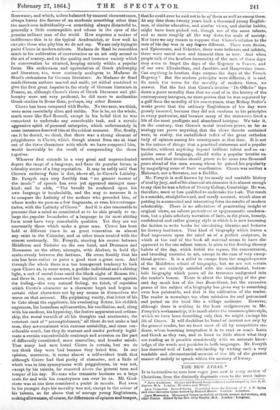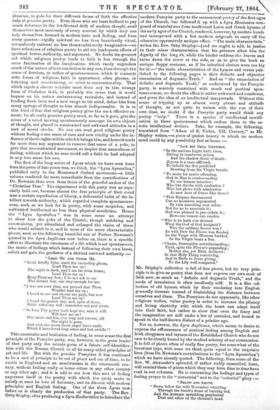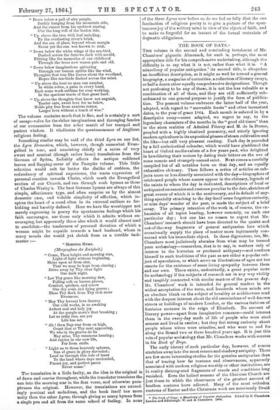THE NEW LYllAS.* IT is instructive to note bow eager
just now is or cry section of Christians, from the distinctly dogmatic even to the most latitu-
• Lyra Anglicana. Hymns and Sacred Songs collected and arranged by tier. E. H. Baynes, M.A. London: Houletou and Wright.
Lyra Domesfica. Second Series. Trensiated from the German of C. J. P. Spitta and other favourite hymn-writers by Richard Massie. London : Longman. Lyra Meuwewa. Hymns and Verses on theLife of Christ, sateient and modern, with other Poems. Edited by the Rev. Orby Shipley, M.A. Loudon : Longman.
dinarian, to gain for their different forms of faith the effective help of genuine poetry. Even those who are least inclined to pay much deference to the intellectual drift of modern thought, avail themselves most anxiously of every current by which they can help themselves forward in modern taste and feeling, and from every quarter—rigidly spiritual no less than luxuriantly ritual, scrupulously rational no less than•traditionally imaginative—we have selections of religious poetry to aid the inadequate efforts of spiritual terror, authority, and argument. No doubt the greatest aid which religious poetry lends to faith is less through the mere fascination of the imagination, which rarely engenders much of the nature of true conviction in any one, than through the sense of freedom, or rather of spontaneousness, which it connects with forms of religious faith in appearance. often gloomy, or fettering and constraining, or sober to conventionality. That which repels a sincere outsider most from any to him strange form of Christian faith, is probably the sense that it would impose on his nature embarrassing restraints, and instead of lending fresh force and a new range to his mind, debar him from many springs of thought to him almost indispensable. It is to this kind of fear that religious poetry gives the most effective an- swer; for all really genuine poetry must, so far as it goes, give the sense of a mind moving spontaneously amongst its own objects of thought, not placed in constrained and awkward attitudes in a sort of moral stocks. No one can read good religions poetry without feeling some sense of ease and new vitality under the in- fluence of the thoughts within which it brings him, and hence it tends far more than any argument to remove that sense of a yoke, to give that unconstrained movement, to inspire that naturalness of feeling, without which no man could call a faith he had adopted in any true sense his own.
The first of the long series of Lyras which we have seen issue from the press of late years was, we think, the "Lyra Apostolica," published early in the Homeward Oxford movement—a little volume rendered far more remarkable from the contributions of Dr. Newman than even from those of the graceful author of the "Christian Year." The experiment with this party was an espe- cially bold one, because almost the first principle of their creed was a certain repudiation of liberty, a deferential habit of the in- tellect towards authority, which regarded complete spontaneous- ness, such as we look for in poetry, with some suspicion, and cultivated intellectual no less than physical asceticism. Hence the " Lyra Apostolica " was in some sense an attempt to show how the yoke of the Church, though subduing and constraining, yet stimulated and enlarged the vision of those who would submit to it, and in most of the more characteristic pieces, such as the following beautiful one of Father Newman's quoted in the Lyra Anglicana now before us, there is a specific effort to illustrate the sweetness of a life which is not spontaneous, the music of feelings which instead of following their own bents, solicit and gain the guidance of a distinct outward authority :—
" LEAD ME AND GUIDE ME.
" Load, kindly light, amid the encircling gloom, Lead Thou me on!
The night is dark, and I am far from home; Lead Thou me on !
Keep Thou my feet ; I do not ask to see The distant way, one step enough for me.
I was not ever thus, nor prayed that Thou Wouldat lead me on ; I loved to see and choose my path, but now Lead Thou me on !
I loved the garish day, and, spite of fears, Pride ruled my will : remember not past years.
" So long Thy power hath kept me, sure it still Will lead me on !
O'er moor and fen, o'er crag and torrent, till The night is gone, And with tho morn those angel faces smile Which I have loved long since and lost awhile !"
This constraint and hesitation of feeling, in some sense the first principle of the Puseyite party, was, however, in the great leader of that party only the minute germ of a future self-identifica- tion with the Roman Church iu all its many-sided principles of art and life. But with the genuine Puseyites it has continued to be a sort of principle to be out of place and out of time, to be exotic in England and an anachronism in the nineteenth cen- tury, without feeling really at home either in any other country or any other age ; and it is odd to see how this sort of feeling expresses itself in the poetry with which the party seeks to satisfy at once its love of harmony, and its discord with modern principles and English feeling. One of the three Lyras now before us is clearly the production of that party. The Rev. Orby Shipley, after producing a Lyra Eucharistica to introduce the modern Puseyite party to the sacramental poetry of the first ages
of the Church, has followed it up with a Lyra Messianica com- posed of translations from traditional Latin and Greek hymns of
the early ages of the Church, rendered, however, by modern hands and interspersed with a few modern originals to carry off the otherwise oppressively antique effect. " The main characteristic," writes the Rev. Orby Shipley—(and we ought to add, in justice to their minor characteristics, that his printers allow him the dignity of the long a's, while the binder reddens the leaves and turns down the cover at the side, so as to give the book an antique Happy costume, as if its inherited clothes were too big for it)—" the main characteristics of the hymns and verses pub- lished in the following pages is their definite and objective enunciation of dogmatic Truth," And as " the enunciation of definite and dogmatic Truth," as understood by the Puseyite party, is scarcely consistent with much real poetical spon- taneousness, no doubt the effect is rather awkward and cumbrous, and gives the idea of an intellectual masquerade. Without this sense of tripping up at almost every phrase and attitude of thought, as not quite in unison with the run of their own time, we doubt if the Puseyite party would think any poetry " holy." There is a species of intellectual mortifi- cation in these quaintnesses which endear them to the as- cetic intellectual divines. Take, for example, the following, translated from "Adam of S. Victor, XII. Century," as Mr. Shipley writes,—a piece of quaint beauty in which no modern mind could by any possibility feel at home :-
"Lux PST OETA "In the nations Light hath risen, Sitting in tenebrous prison
And the shadow drear of death: Joyous is a race afflicted, To behold the Son predicted Drawing from the Virgin breath. "To atone for man's offending, God in Man is condescending To our human miseries : Who but throbs with exultation ? Who but glows with admiration At new Acts of Grace like these ? "This Enigma Sacramental Can no keenness argumental By vain searching ever solve: Not for us to ascertain it ; God was pleased to pre-ordain it ; How—no reason can resolve.
"Who is he hath e'er divined What the God of God designed ?
Who the sublime Secret won ?
As with Dew the Fleece was flooded, As the Verge with Blossom budded, So the Virgin bears a Son.
" Chaste, Conception notwithstanding ; Virid, spite the Flower's expanding;
Mother she, yet Maid, declared : In that Holy Thing conceiving, And in Birth to Jesus giving,
To the Lily well compared."
Mr. Shipley's collection is full of fine pieces, but its very prin-
ciple is to give us poetry that does not express our own mode of faith now, so much as " definite and dogmatic Truth," and the mode of translation is often needlessly stiff. It is a fine col- lection of old hymns, which by their rendering into English generally increase instead of diminishing the distance between ourselves and them. The Puseyites do not apparently, like other religious bodies, value poetry in order to increase the pliancy and living elasticity with which the heart can adapt itself into their faith, but rather to show that even the fancy and the imagination are still under a law of restraint, and bound to speak in the half-known dialect of a pristine age.
Not so, however, the Lyra Anglicana, which seems to desire to express the efflorescence of poetical feeling among English and Irish clergymen and laymen of the Established Church who do not care to be closely bound by the studied sobriety of our communion. It is full of pieces often of really fine poetry, but somewhat of the luxuriant type, with none we think quite equal to the exquisite lines (from Dr. Newman's contributions to the "Lyra Apostolica") which we have already quoted. The following, from some of the Rev. W. Alexander's splendid, if rather richly enamelled, lines, will remind them of pieces which they may from time to time have read in our columns. He is contrasting the feelings and types of feeling proper to the " terrestrial" and to the "celestial" glory :—
" Below AND ABOVE.
" Down below the wild November whistling Through the beech's dome of burning red, And the Autumn sprinkling penitential Dust and ashes on the chesnut's head. " Down below a pall of airy purple, Darkly hanging from the mountain side, And the sunset from his eyebrow staring O'er the long roll of the leaden tide.
" Up above the tree with leaf unfading, By the everlasting river's brink, And the sea of glass, beyond whose margin Never yet the sun was known to sink.
" Down below the white wings of the sea-bird, Dashed across the furrows dark with mould, Flitting like the memories of our childhood Through the trees now waxen pale and old.
" Down below imaginations quivering Through our human spirits like the wind, Thoughts that toss like leaves about the woodland, Hopes like sea-birds flashed across the mind.
" Up above the host no man can number, In white robes, a palm in every hand, Each some work sublime for ever working, In the spacious tracts of that great land.
" Up above the thoughts that know not anguish, Tender care, sweet love for us below, Noble pity free from anxious terror, Larger love without a touch of woe."
The volume contains much that is fine, and is certainly a sort of escape-valve for the richer imaginations and thronging fancies of our communion from the sober march of her tranquil and
patient wisdom. It vindicates the spontaneousness of Anglican religious feeling.
Something similar may be said of the third Lyra on our list, the Lyra Domestica, which, however, though somewhat Evan-
gelical in tone, and consisting chiefly of a series of very sweet and musical (though rather loose) translations from the German of Spitta, foolishly affects the antique reddened leaves and flapping cover of the Puseyite volume. This little selection would suit far better the dislike of emblem, the redundancy of spiritual experience, the warm expression of personal emotion towards Christ, which mark the Evangelical section of our Church, and run through such hymns as those of Charles Wesley's. The best German hymns are always of this simple, affectionate type, and often surprise us by the almost domestic ease, and voluble simplicity of affection, which in- spires the heart of a creed often in its external outlines so for- bidding and harshly defined. Here we have the worshipper not merely expressing in poetry the spontaneous feelings which his faith encourages, nor those only which it admits without en- couraging, but apparently those also which it would almost tend
to annihilate—the tenderness of personal devotion of which a woman might be capable towards a hard husband, whom in many moods she would yet shrink from as a terrible task-
master :—
" MORNING HYr N.
(Morgenglanz der Ewigkeit) " Come, Thou bright and morning star, Light of light without beginning, Shine upon us from afar,
That wo may be kept from sinning ; Drive away by Thy clear light Our dark night " Let Thy grace like morning dew, Falling soft on barren places, Comfort, quicken, and renew Our dry souls and dying graces ; Bless Thy flock from Thy rich store Evermore.
" May Thy fervent love destroy Our cold works, in us awaking Ardent zeal and holy joy At the purple morn's first breaking ; Let us truly rise, ere yet Life has set.
" Ah ! thou Day-star from on high, Grant that at Thy next appearing, We who in the graves do lie May arise, Thy summons hearing; And rejoice in our new life, Far from strife.
" Light us to those heavenly spheres, Sun of grace in glory shrouded ; Lead us through this vale of tears To the land where days unclouded, Purest joy, and perfect peace Never cease."
The translation is a little faulty, as the idea in the original is of dawn and sunrise throughout, while the translator translates the sun into the morning star in the first verse, and otherwise para- phrases the original. However, the translations are exceed. ingly poetical and melodious, and the book itself has more unity than the other Lyras, through giving so many hymns from a single pen and all from the same school of feeling. In none of the three Lyres now before us do we feel so fully that the one fascination of religious poetry is to give a picture of the spon- taneous joy of the solitary mind in view of the objects of faith, and to make us forgetful for an instant of the formal restraints of dogmatic obligations.
































 Previous page
Previous page